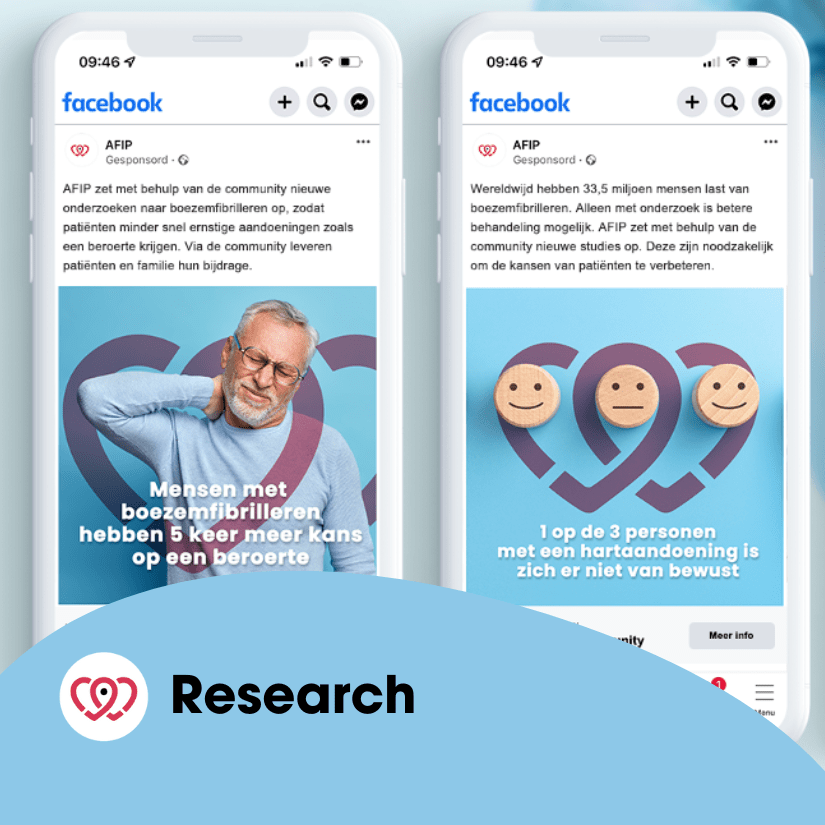Atrial fibrillation information library
Did you know that atrial fibrillation is the most common heart rhythm disorder? Right here you can read everything about the symptoms, causes, diagnosis and treatments.
Co-creating AF solutions
This platform is a space where patients and researchers come together, and join in the conversation with professionals. We urge you to share your questions, thoughts, and experiences with others. Together with the community we set up studies that are needed.
Donate to AF research
There is no cure for atrial fibrillation, for this reason research is exceedingly important. It is because of you, that we can better understand and treat atrial fibrillation. This is all possible thanks to your help. Donate today.

International Atrial Fibrillation Network ‘CIRCULAR’
The CIRCULAR consortium, led by Prof. Bianca Brundel and funded by the Dutch Research Council (NWO), aims to advance the understanding of atrial fibrillation and improve its treatment through collaboration with patients and healthcare providers. Focusing on bioelectrical dysfunction and biomarkers, the project pioneers new therapeutic strategies for a patient-centered approach.
AFIP foundation hearts the heart
The AFIP Foundation connects researchers and patients with atrial fibrillation. We have an ANBI status, which means that we are committed to the public interest. The AFIP Foundation’s mission is to improve the treatment of atrial fibrillation through co-creation. A team of research groups led by Dr. Bianca Brundel and Dr. Natasja de Groot, conducts innovative research into the mechanism, diagnostics and possible medicines of AF.
Our main goal is to make atrial fibrillation more treatable. Your role in that is vital, since without donations we would not be able to conduct our unprecedented research. Your participation on the AFIP forum sharing experiences with fellow patients and researchers, is also key. Together we will learn to better understand atrial fibrillation.

No less than 37 million people worldwide know that they have atrial fibrillation. However, there are still thousands of people without a diagnosis. In the AFIP data base you can read all about the most common heart rhythm disorder, anything from symptoms to possible treatments.
Most searched topics
Women and Afib
Last update: March 15, 2024 This article is written by Ronja Laurila and medically reviewed by Dr. Maryam Kavousi. Why is women’s health important in atrial fibrillation? Although not obvious,
Afib Medicine
Last update February 1, 2024 The sources in this article are reviewed by Prof. Dr. Natasja de Groot and translated by Ronja Laurila. Treating atrial fibrillation with antiarrhythmic drugs Cardiac arrhythmias, such as
Ablation for Afib
Last update February 1, 2024 The sources in this article are reviewed by Prof. Dr. Natasja de Groot and translated by Ronja Laurila. Treating atrial fibrillation with an ablation In patients with atrial
Atrial fibrillation and Lifestyle
Last update February 1, 2024 Sources used in this article are reviewed by Prof. Dr. Bianca Brundel and translated by Ronja Laurila. What can you do to prevent Afib? Health scientists emphasize the
Afib causes and risk factors
Last update: January 18, 2024 Sources used in this article are reviewed by Prof. Dr. Natasja de Groot and translated by Ronja Laurila. Various atrial fibrillation risk factors Little is
Atrial fibrillation and Diet
Last update: January 18, 2024 The sources in this article are reviewed by Prof. Dr. Bianca Brundel and translated by Ronja Laurila. Can Changes in Your Diet Help Prevent Atrial
Successful studies
thanks to the AFIP community
The AFIP community is an imperative link in research into atrial fibrillation. Thanks to your experiences, donations and participation, we have been able to set up the studies below.
Projects we are doing thanks to your donation
In addition to doing innovative research, the AFIP Foundation is committed to atrial fibrillation in many ways. These are our latest projects.

Trial
L-Glutamine study
L-Glutamine restores energy levels and allows for potentially increased protection against atrial fibrillation.

Trial
GGA study
This medicine aids in the reparation of cell damage and helps protect against atrial fibrillation in experimental models.

Opening
Genetic AF clinic
We heard you. A significant number of AF patients indicated AF runs in the family and now we’re opening Europe’s first genetic AF clinic.

Hire
Agnes Muskens
Because of your donation AFIP was able to hire Agnes: our patient communication superstar.
News and Articles
Read all about the latest developments regarding atrial fibrillation, and explore the insights of opinion leaders and prominent researchers as well as any other related news.
New research reveals which forms of communication increase awareness and engagement among people with atrial fibrillation.
Have you ever seen a Facebook or Instagram post about a health condition which caught your eye, or not? Our new study has looked into exactly what kind of health
The Overlapping World of Cancer and Afib: What We Know and Why It Matters
Most people think of cancer and heart problems as two separate battles. But emerging research is revealing a surprising connection between the two, especially when it comes to atrial fibrillation
Gut to Heart: Uncovering the Surprising Link Between Atrial Fibrillation and Gut Health
Gut health has long been associated with digestion and immune function, but recent research suggests it might also play a significant role in heart health. For individuals with atrial fibrillation
Can the Keto Diet Trigger Atrial Fibrillation? Exploring the Science Behind This Diet-Heart Connection
The ketogenic diet is often talked about as a promising diet to improve one’s health outcomes. The diet is known for promising weight loss, improved energy, and metabolic benefits. But
Holiday Hazards: Managing Afib Triggers During the Winter Season
The holiday season is a time for celebration, gatherings, and indulgence, but for those with atrial fibrillation (Afib), it can also bring hidden risks. From overeating to cold weather and













